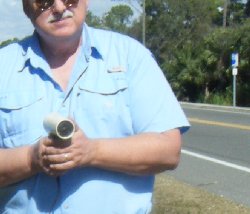 Sometimes we are cognizant of the changes occurring around us, such as the president's controversial health care bill which was extensively covered by the media. Just about every adult in this country has heard of it; they may not understand it, but they are aware of it. Most of the changes affecting us though are not visible to the naked eye, yet they can have as profound effect on us as "Obamacare." Such is Attorney General Eric Holder's full court press against the Bail Bond Industry representing a premeditated attempt to expand government and suppress the free enterprise system. Like my recent article explaining how new government rules inhibit health care providers from tending to the business of patient care, this legislation will undeniably affect all of us. Let me explain.
Sometimes we are cognizant of the changes occurring around us, such as the president's controversial health care bill which was extensively covered by the media. Just about every adult in this country has heard of it; they may not understand it, but they are aware of it. Most of the changes affecting us though are not visible to the naked eye, yet they can have as profound effect on us as "Obamacare." Such is Attorney General Eric Holder's full court press against the Bail Bond Industry representing a premeditated attempt to expand government and suppress the free enterprise system. Like my recent article explaining how new government rules inhibit health care providers from tending to the business of patient care, this legislation will undeniably affect all of us. Let me explain.
The general public has long understood the concept of posting bail in order to be released from jail prior to trial. It is even referenced in the Eighth Amendment of the Bill of Rights whereby excessive bail is prohibited. The purpose of bail is two-fold: it assures the accused returns for trial, and he/she will behave properly and not pose a threat to the community while awaiting trial. The accused is either remanned into police custody or allowed to post bail as prescribed by a judge. Bondsmen, who operate independently from the government, offer bonds for posting. This is typically arranged through a family member, a close friend, or perhaps the accused's employer, and a bond can normally be obtained at a percentage rate of the bail, such as 10%. Bail bondsmen are seasoned veterans who possess a good judge of character. They carefully analyze the accused, the person posting the security, and the risks involved with freeing the defendant. To the bondsman, this is a relatively straight-forward business transaction; he will obviously not post bail if he believes the accused to be a flight risk or will cause trouble. Few people realize the bail bond industry is heavily regulated and must comply to numerous laws, rules, and regulations.
What the public doesn't understand is the pretrial release program which is advocated by the Attorney General. This is a program which has been evolving over the last three decades and seeks to relieve overcrowded jails by implementing a government implemented program to interview accused prisoners, determine those who are not a threat to their victims and community, and release them pending trial. Although this may sound fine on the surface for misdemeanor offenders, it also applies to certain felony cases, such as those accused of child pornography, theft, battery, and dozens of other crimes. Crimes of major violence or repeat offenders are normally not eligible to be considered under this program. If implemented in full, the pretrial programs will inevitably eliminate the need for bail bondsmen completely.
"Across the country, nearly two thirds of all inmates who crowd our county jails, at an annual cost of roughly nine billion taxpayer dollars, are defendants awaiting trial. Two thirds of all inmates are awaiting trial. Now, many of these individuals are nonviolent, non-felony offenders, charged with crimes ranging from petty theft to public drug use, and a disproportional number of them are poor."
"Now, the reality is, it doesn't have to be this way. Almost all of these individuals could be released and supervised in their communities and allowed to pursue or maintain employment, and participate in educational opportunities and their normal family lives, without any risk of endangering their fellow citizens or fleeing from justice."
- Eric H. Holder, Jr.
Attorney General, US Department of Justice
National Symposium on Pretrial Justice
May 31, 2011
The impetus behind pretrial programs is overcrowded jails. Proponents of the program claim the current system costs $9 billion per year to operate. Their math is a bit fuzzy as they cannot demonstrate how the pretrial system will lower this number, nor do they take into consideration how bonded defendants are saving money for the taxpayers. In reality, studies show 12% of those defendants released through a pretrial program do not return for their trial appearance and, consequently, a bench warrant is issued to apprehend them. When the accused fails to appear at trial, court dates have to be rescheduled, which incurs costs associated with judges, lawyers and other courtroom personnel, not to mention law enforcement costs to apprehend the defendant. Further, there is the risk of the accused committing another crime thereby incurring even more costs. Currently, the rate ranges from 9% to 16%, with 12% committing violent offenses. Such variables are conveniently overlooked by the pretrial proponents. In contrast, under the bail bond system there are significantly less defendants failing to appear at trial and committing additional crimes. Taxpayers should question the wisdom of creating a program that actually increases crime as opposed to reducing it.
In our court system today there appears to be an emphasis on releasing offenders as opposed to imprisoning them to await trial, simply for the sake of saving a buck. The courts are littered with cases of defendants being released on their own recognizance (ROR) who have long rap sheets, facing serious charges such as battery, or both. Some ROR cases are unsupervised, including those involving felonies, and others requiring supervision. The question though is, who is to perform the supervision? There are also instances of ROR supervised release of defendants who live in another county. Again, who is to supervise them? As you study ROR cases, it becomes rather unsettling to discover it is easier to get out of jail than to get into it.
Let's stop and consider why people do not post bail and allow a family member or friend to remain in jail. In many cases, the accused is unable to abide by any semblance of rules and regulations. More than anything, this is an indictment of our society's deteriorating parental skills which seems to have trouble teaching responsibility, accountability, and discipline. Instead, a family would rather have their "deadbeat" left in jail where they might learn a lesson or two as opposed to being released on bail.
Whereas the rules and regulations for the bail bond industry have long been established, the policies and procedures for pretrial programs are still evolving. Some are fine, others lack any form of organization and enforcement. For example, the defendant should be properly interviewed prior to making a determination for their release. Quite often this is overlooked. Although there are standards to implement such programs, many are not accredited which means processing can be sloppy and inconsistent, the very stereotype of a government bureaucracy running amok. To illustrate, in Florida only five counties (out of 67) are accredited for Pretrial services (Source: Florida Accreditation). Obviously, this means people are being released who may potentially cause problems either by not appearing at trial, or causing other offenses.
Urban areas with substantial budgets are more inclined to establish a pretrial program than a rural area who cannot afford creating additional government overhead. Even the larger metropolitan areas are having a hard time justifying it during these troubled economic times where government budgets are being slashed. The point is, it is extremely difficult, if not impossible, to realize state-wide uniformity in pretrial programs. Whereas one county may offer a credible program, a neighboring county may not.
Pretrial advocates are moving quickly on this matter. If they have their way, bail bondsmen may go the way of the Dodo bird in as little as three years. So it becomes a matter of who the public believes can more effectively manage pretrial offenders, the government or the bail bond industry. Whereas one-side casts aspersions against bail bondsmen as more interested in a buck as opposed to the accused, the other side questions the ability of government to implement an important program to the same level of success as the bail bondsmen.
The real issue is which system can most effectively protect the public, assure defendants will make their court appearances, help reduce jail population, and do so all at reasonable costs. So far, bail bondmen have a better track record, particularly in the area of costs which are assumed by the bail bondsmen as opposed to the taxpayer. As to the pretrial system, it is still too new, still too experimental, still unproven, and will likely result in another government bureaucracy at considerable expense. Taxpayers should question the logic of throwing the baby out with the bath water.
Is there room for compromise? Certainly, both programs have advantages and can peacefully co-exist but the pretrial zealots seem bent on eliminating the bail bond industry and county governments are being asked to choose sides as opposed to finding ways to work together.
"There is plenty of room for the two forms of release to coexist."
- Sarasota Herald-Tribune
"Sensible, cost-effective justice"
February 16, 2012
How this issue has avoided the public spotlight is insidious. While the public is distracted, the government quietly tries to expand and push private enterprises out of the way. As obscure as the bail bond industry is, it makes you wonder what else they are trying to commandeer. Fortunately, this is an election year, making it an ideal time to ask candidates their position on this subject, particularly those running for sheriff. Bottom-line, do they believe government should expand at taxpayer expense or continue to utilize bail bondsmen, a heavily regulated industry with a proven track record. Your court date is November 6th, Election Day. Be there.
Keep the Faith!
Note: All trademarks both marked and unmarked belong to their respective companies.
 Tim Bryce is a writer and the Managing Director of M. Bryce & Associates (MBA) of Palm Harbor, Florida and has over 30 years of experience in the management consulting field. He can be reached at timb001@phmainstreet.com
Tim Bryce is a writer and the Managing Director of M. Bryce & Associates (MBA) of Palm Harbor, Florida and has over 30 years of experience in the management consulting field. He can be reached at timb001@phmainstreet.com
For Tim's columns, see:
http://www.phmainstreet.com/timbryce.htm
Like the article? TELL A FRIEND.
Copyright © 2012 by Tim Bryce. All rights reserved.
 For something that is supposed to be "soft", computer software exhibits some pretty "hard" characteristics. The original premise behind the COBOL programming language was to devise a language that could be easily ported to several computers. This never truly happened due to computer manufacturers who tweaked the language to suit their particular needs. What ran on an IBM machine, for example, didn't necessarily run the same on Honeywell, UNIVAC, or the rest of the BUNCH. Consequently, software developers had to maintain different versions of source code to suit the particular needs of the various computer compilers. This plagued all third generation languages until Sun introduced JAVA in the 1990's. The JAVA premise that a programmer should "write once, run everywhere" was the right idea and the language began to gain momentum, until it ran into Microsoft who didn't want to turn the operating system into an inconsequential afterthought. JAVA lives on, but not to the extent it should have, and developers are back to managing separate versions of source code.
For something that is supposed to be "soft", computer software exhibits some pretty "hard" characteristics. The original premise behind the COBOL programming language was to devise a language that could be easily ported to several computers. This never truly happened due to computer manufacturers who tweaked the language to suit their particular needs. What ran on an IBM machine, for example, didn't necessarily run the same on Honeywell, UNIVAC, or the rest of the BUNCH. Consequently, software developers had to maintain different versions of source code to suit the particular needs of the various computer compilers. This plagued all third generation languages until Sun introduced JAVA in the 1990's. The JAVA premise that a programmer should "write once, run everywhere" was the right idea and the language began to gain momentum, until it ran into Microsoft who didn't want to turn the operating system into an inconsequential afterthought. JAVA lives on, but not to the extent it should have, and developers are back to managing separate versions of source code. From modest beginnings, Social Media has blossomed into a worldwide phenomenon familiar to millions of people. It has been used to reconnect old friends, classmates and business acquaintances, to promote one's products and services, and to discuss a variety of subjects and share files. As we should all know by now, it has been used to coordinate flash mobs, protests, and topple governments. Many people are addicted to it, others couldn't care less, but we certainly cannot ignore it. The big question though is, if we are going to use it, how much of ourselves do we really want to reveal?
From modest beginnings, Social Media has blossomed into a worldwide phenomenon familiar to millions of people. It has been used to reconnect old friends, classmates and business acquaintances, to promote one's products and services, and to discuss a variety of subjects and share files. As we should all know by now, it has been used to coordinate flash mobs, protests, and topple governments. Many people are addicted to it, others couldn't care less, but we certainly cannot ignore it. The big question though is, if we are going to use it, how much of ourselves do we really want to reveal? When you have been in the systems business for as long as I have, you have been afforded the opportunity to see a lot of things. I've been fortunate to meet many interesting people with some rather forward-thinking business ideas, but I have also met more than my fair share of deadheads. When you witness several system snafus, you learn to appreciate those systems that were successful and made a dramatic impact on business. Here are a few such stories from my travels:
When you have been in the systems business for as long as I have, you have been afforded the opportunity to see a lot of things. I've been fortunate to meet many interesting people with some rather forward-thinking business ideas, but I have also met more than my fair share of deadheads. When you witness several system snafus, you learn to appreciate those systems that were successful and made a dramatic impact on business. Here are a few such stories from my travels: Man has been measuring work as long as he has applied organized methods to building or manufacturing anything of substance. Henry Ford was, of course, sensitive to work measurement in order to produce an affordable automobile. Undoubtedly, the builders of the ancient pyramids of Egypt also measured work in order to calculate schedules and allocate the use of resources effectively. The work of W. Edwards Demming is legendary in how it helped revolutionize post-WWII Japan. The need to measure work should be obvious: to maximize productivity, minimize costs, and to seek new and improved methods to expedite development. It involves analyzing such things as development methodologies and tools, monitoring quality and costs, and the amount of effort required to perform a given task.
Man has been measuring work as long as he has applied organized methods to building or manufacturing anything of substance. Henry Ford was, of course, sensitive to work measurement in order to produce an affordable automobile. Undoubtedly, the builders of the ancient pyramids of Egypt also measured work in order to calculate schedules and allocate the use of resources effectively. The work of W. Edwards Demming is legendary in how it helped revolutionize post-WWII Japan. The need to measure work should be obvious: to maximize productivity, minimize costs, and to seek new and improved methods to expedite development. It involves analyzing such things as development methodologies and tools, monitoring quality and costs, and the amount of effort required to perform a given task. I was recently reviewing the statistics on the various forums where my columns appear and was pleased to discover I have finally passed one million readers. I don't know who the person was but "Thank You" as well as the rest of you who follow my work in one capacity or another. This certainly didn't happen overnight. I have been writing for over thirty years now so I'm actually not surprised to have passed the million milestone. Although I primarily write for the American market, my work has appeared all over the world. They particularly seem to love me in Australia, India, the Philippines, and South Africa. Now if I can just get Florida to take notice.
I was recently reviewing the statistics on the various forums where my columns appear and was pleased to discover I have finally passed one million readers. I don't know who the person was but "Thank You" as well as the rest of you who follow my work in one capacity or another. This certainly didn't happen overnight. I have been writing for over thirty years now so I'm actually not surprised to have passed the million milestone. Although I primarily write for the American market, my work has appeared all over the world. They particularly seem to love me in Australia, India, the Philippines, and South Africa. Now if I can just get Florida to take notice. For the last several years our Masonic lodge has been hosting an annual dinner to honor the county's "Deputy of the Year." Senior officers at the sheriff's office select a person they believe deserves the honor and informs the Lodge as to why the individual merits the award. The Lodge then prepares a respectable plaque, schedules a dinner and invites the officer's family, colleagues, and of course Lodge members. A lot of nice words are spoken on the deputy's behalf, several photos are taken, and a small honorarium is presented to the officer who typically donates it to a local charity. The Lodge prepares a press release regarding the award and distributes it accordingly to the local press. It doesn't really require a lot of work and it is the Lodge's small way of expressing its gratitude not only for the job the deputy has performed, but for the sheriff's office overall. It's our way of saying "thank you" for their service. It is certainly not a lavish affair, but it is still greatly appreciated by the department for the recognition they receive. The honoree is flattered by the attention bestowed on him by the Lodge and his superiors, the family looks on proudly, and the public is informed of the good work performed by the sheriff's office.
For the last several years our Masonic lodge has been hosting an annual dinner to honor the county's "Deputy of the Year." Senior officers at the sheriff's office select a person they believe deserves the honor and informs the Lodge as to why the individual merits the award. The Lodge then prepares a respectable plaque, schedules a dinner and invites the officer's family, colleagues, and of course Lodge members. A lot of nice words are spoken on the deputy's behalf, several photos are taken, and a small honorarium is presented to the officer who typically donates it to a local charity. The Lodge prepares a press release regarding the award and distributes it accordingly to the local press. It doesn't really require a lot of work and it is the Lodge's small way of expressing its gratitude not only for the job the deputy has performed, but for the sheriff's office overall. It's our way of saying "thank you" for their service. It is certainly not a lavish affair, but it is still greatly appreciated by the department for the recognition they receive. The honoree is flattered by the attention bestowed on him by the Lodge and his superiors, the family looks on proudly, and the public is informed of the good work performed by the sheriff's office. Last year you may recall me discussing the current effort by the government to create electronic medical records by physicians, hospitals, and other health care providers (see
Last year you may recall me discussing the current effort by the government to create electronic medical records by physicians, hospitals, and other health care providers (see  During this time of the year, when tourists are flocking to Florida, traffic can be quite congested on our highways, not to mention fast. Although the posted speed limit is 45mph for the highway in front of our office, motorists frequently exceed the limit (loudly I might add). Like any local government these days, our county has to tighten its belts, particularly the sheriff's office which has been experiencing budget cuts. Not surprising, they tend to overlook speeding in certain areas, such as in front of my office. So I took it upon myself to devise a cost effective way to slow traffic.
During this time of the year, when tourists are flocking to Florida, traffic can be quite congested on our highways, not to mention fast. Although the posted speed limit is 45mph for the highway in front of our office, motorists frequently exceed the limit (loudly I might add). Like any local government these days, our county has to tighten its belts, particularly the sheriff's office which has been experiencing budget cuts. Not surprising, they tend to overlook speeding in certain areas, such as in front of my office. So I took it upon myself to devise a cost effective way to slow traffic. While the media and public have been focused on the presidential races, we must be cognizant there is more to the November 6th elections than just the White House, much more. There are 33 Senate seats up for grabs as well as all 435 seats in the House. Although we are currently paying little attention to these races, we must be mindful of their impact on the balance of power in the Capitol. Currently, the Democrats are in control of the Senate, and the Republicans of the House. Consequently, it is little wonder why we have gridlock in Washington which is something we all should have expected following the 2010 elections. Now we have a chance to change it.
While the media and public have been focused on the presidential races, we must be cognizant there is more to the November 6th elections than just the White House, much more. There are 33 Senate seats up for grabs as well as all 435 seats in the House. Although we are currently paying little attention to these races, we must be mindful of their impact on the balance of power in the Capitol. Currently, the Democrats are in control of the Senate, and the Republicans of the House. Consequently, it is little wonder why we have gridlock in Washington which is something we all should have expected following the 2010 elections. Now we have a chance to change it. I recently came upon a research paper addressing the effectiveness of today's managers. Actually, the paper was produced back in 2004 (
I recently came upon a research paper addressing the effectiveness of today's managers. Actually, the paper was produced back in 2004 ( I remember when I was moving to Florida years ago, my in-laws in Ohio warned me, "You're going to miss the change of seasons." It's been 27 years since then and, so far, so good. No, I do not miss the change of seasons and frankly, the mere thought of going back into the snow belt gives me the shivers. Keep in mind, I lived in the north most of my life and survived the great snow of 1967 in Chicago, but enough is enough. Also, this is not about boasting how the Sunshine State has a better climate than the northern states. I learned a long time ago that Florida is not for everyone and, as such, you must be mentally prepared to move down here. Life is certainly different.
I remember when I was moving to Florida years ago, my in-laws in Ohio warned me, "You're going to miss the change of seasons." It's been 27 years since then and, so far, so good. No, I do not miss the change of seasons and frankly, the mere thought of going back into the snow belt gives me the shivers. Keep in mind, I lived in the north most of my life and survived the great snow of 1967 in Chicago, but enough is enough. Also, this is not about boasting how the Sunshine State has a better climate than the northern states. I learned a long time ago that Florida is not for everyone and, as such, you must be mentally prepared to move down here. Life is certainly different.